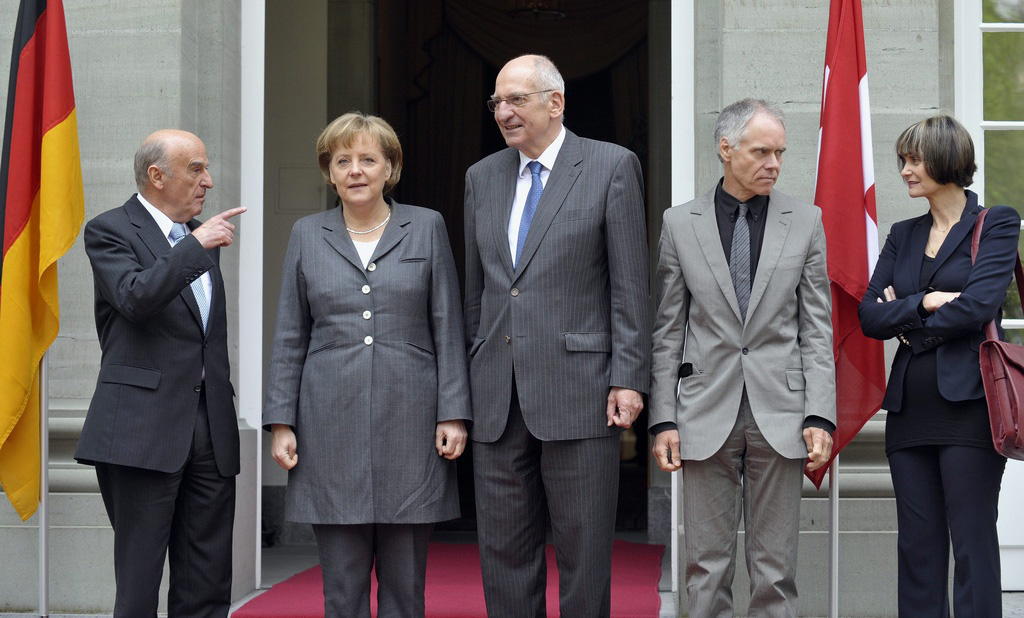Trade unions demand stable financial sector

Trade unions want a ban on tax-evasion assets, a levy on bonuses and “moderate” salaries to replace performance pay in order to stabilise the Swiss financial sector.
The political left has for decades been demanding tax equality and an end to banking secrecy to prevent people profiting from tax evasion. However, the details of a proposed “clean assets” strategy are far from concrete.
Pressure from other countries led the government to decide a year ago that it could do away with the Swiss legal distinction between tax evasion and fraud, and in future, promise more administrative assistance to foreign tax-evasion investigations.
Additional pressure has come from a spate of stolen bank data, pronouncements from the Organisation for Economic Development and Co-operation (OECD) that connected tax evasion with money laundering, and demands from the European Commission for an automatic exchange of data in cross border investigations.
Many Swiss politicians have also added their voices to demands for an end to tax-evasion assets entering the country.
But questions remain: How would a new “clean assets” policy work in concrete terms? Who would determine whether investors’ money has been taxed? What would banks do with money that is not due to be taxed until the following tax year?
Ban toxic products
“There is as yet no precise criteria how this will take place,” Paul Rechsteiner, head of the Swiss Trade Union Federation, told swissinfo.ch. “It is now crucial that conclusions are drawn about the causes of the crisis and measures are put into place to prevent a repeat.”
“This would require [banks] to have more resources and a raising of the balance sheet by around three to ten per cent. It also requires Switzerland to accept international regulations that would ensure toxic products are no longer possible.”
Rechsteiner denies that trade unions face a dilemma over the “clean assets” financial strategy. But it is clear that assets would leave the Swiss sector without banking secrecy, and that would threaten jobs.
The economic consequences are hard to calculate, according to the federation’s chief economist, Daniel Lampart. “If all untaxed assets were to leave Switzerland, it could cost one per cent in gross domestic product and more than 10,000 jobs.”
The fact that foreigners bring their assets to Switzerland for other reasons, such as political instability in their own countries or fear that they will be confiscated, adds to the complications in predicting the real consequences.
Legal uncertainty
The debate in Switzerland has shifted to the cost of measures to clean up the financial sector, measures that can be introduced to protect jobs and a means of compensating shortfalls in revenues. Parliament is now looking at introducing a Tobin tax – a levy on financial transactions.
Lampart also wants bank bonuses to be replaced with more moderate fixed salaries, and he has called for a French- or British-style tax on bonuses over SFr40,000 ($37,000).
There are other ways to win the loyalty of bank staff, according to Denise Chervet, general secretary of the Swiss Bank Employees Association. “Job stability, supplementing family allowances, flexible working hours and health plans,” she listed.
The bonus system benefits higher-placed executives, but “for other employees it becomes more pressure to perform”, Chervet said. For many staff, the legal uncertainty surrounding tax evasion is a “catastrophe”, she added.
“They risk running afoul of the law. Some people are not allowed to travel abroad. That is not very pleasant,” she said.
Chervet has demanded that the Swiss authorities find a quick solution to the problem of tax evasion with neighbouring countries, so that people can “calmly dedicate themselves to their work again”.
Andreas Keiser, swissinfo.ch (Translated from German by Matthew Allen)
The financial crisis has led to many countries criticising Switzerland’s banking secrecy for encouraging foreign citizens to hide their assets from local tax authorities.
The OECD placed Switzerland on a grey list of uncooperative tax havens in April 2009. The Swiss were removed in September after renegotiating several double taxation treaties, but they have refused to automatically transfer information to tax investigators without proof of crimes.
Former German Finance Minister Peer Steinbrück referred last summer to the Swiss resembling Indians running away from the cavalry. Italian Finance Minister Giulio Tremonti said that he wanted to “bleed dry” the financial sector in the southern Swiss canton of Ticino.
Several countries, including Italy, France, Britain and the United States launched tax amnesties last year in an effort to repatriate assets from tax cheats.
The most damaging tax-evasion case involved the activities of UBS bank in the US. In February 2009, UBS was fined $780 million after admitting to helping US citizens to dodge taxes.
In September, the Swiss government was forced to agree to provide the details of 4,450 UBS clients to the US – in effect violating Swiss banking secrecy to prevent a ruinous court case for UBS.
A former employee of HSBC private bank in Geneva ran away with sensitive data on thousands of clients that he handed over to the French authorities last year. Germany has also received stolen bank data from unknown sources.

In compliance with the JTI standards
More: SWI swissinfo.ch certified by the Journalism Trust Initiative














You can find an overview of ongoing debates with our journalists here . Please join us!
If you want to start a conversation about a topic raised in this article or want to report factual errors, email us at english@swissinfo.ch.